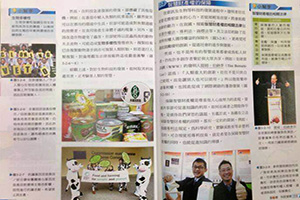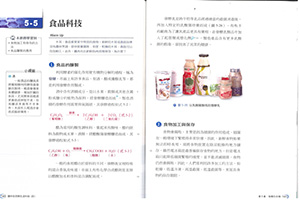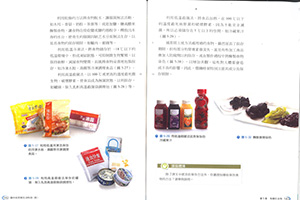 |
 |
 |
 |
 |
|||

1) Social Studies Social studies – Agricultural technology & food preservation With the advances of agricultural technology, farmers not only strive to increase the output / quantity produced, but also seek for better product quality. Thus, gene-modified crops have been cultivated, and new food preservation methods have been invented. Chemical fertilizers, pesticides, additives and preservatives are known to harm the land and human body. People are more willingness to buy organic food, and food safety has become a social concern. Our 9th grade social studies textbook introduced the current technological development, of which biotechnology in farming and gene modification is mentioned. At present, gene-modified soybeans have been permitted to add into animal feed by the United States Department of Agriculture (USDA). Although wheat is not permitted to be genetically modified, there is gene-modified wheat that can still be found in the marketplace. This caused some alarm in countries such as the European Union (EU), Japan, and Korea. The world is paying attention to the development and influence of gene-modified food. Agricultural technology not only focuses on increasing the crop output, but also takes into account of crop diversity. Whether it is to prolong the preservation duration of food or developing gene-modified crops, these are all biotechnological efforts to solve the problem of food supply in the world.
2) Natural science Natural science – Natural preservation and organic fertilizers All kinds of food will decay over a period of time. One reason why food spoils is because of germs in the air. Even though refrigerators may prolong the duration of food preservation, germs are not killed in the cool environment and foods will still be spoiled over time. In the 8th grade Nature textbook, there is a unit on natural preservation: sterization by high temperature, or by low temperature and drying such as dry mushrooms and tea leaves; or addition of sugar, salt, and vinegar in food so that moisture can be released such as pickled meat or radish. Without moisture, bacteria cannot survive, thus prolonging food storage. Decayed or spoiled food can be recycled into organic fertilizers. The kitchen waste can be placed into the bin, and viable bacteria powder is added to decompose the food. After two or three months in the decomposer, the kitchen waste turn into fertilizers for plants and vegetables. It is an environmentally friendly way of recycling kitchen waste.
|
||||||||||||||||||||||||||
|



